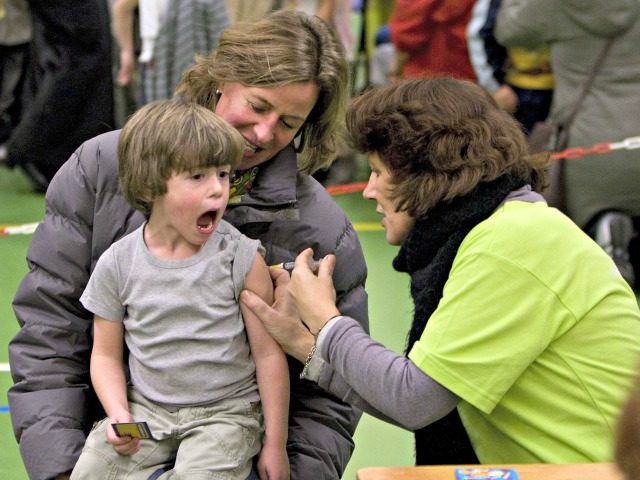A study published on Thursday by the United Nations children’s agency UNICEF found a dramatic global decline in public support for childhood vaccination in the years of the Wuhan coronavirus pandemic, corresponding to the “largest sustained backslide in childhood immunization in 30 years.”
UNICEF’s annual State of the World’s Children report for 2023 described the coronavirus pandemic as a “disaster for childhood immunization.”
“It set immunization back to levels last seen in 2008. In just two years, the world lost more than a decade’s progress in ensuring every child is adequately immunized,” the report detailed, attributing the regression to “some issues specific to the pandemic, particularly the impact of lockdowns and service disruption.”
“The pandemic interrupted childhood vaccination almost everywhere, especially due to intense demands on health systems, the diversion of immunization resources to [Wuhan coronavirus] vaccination, health worker shortages and stay-at-home measures,” UNICEF explained in a press release announcing the publication of the report.
The agency documented 67 million children around the world missing routine vaccines – including longstanding immunological products to combat diseases such as polio and measles – between 2019 and 2021. Of these, 48 million children were identified as “zero-dose,” meaning they have not received a single vaccine dose in their lives.
The UNICEF report identified measles and polio as particularly alarming diseases for children to remain unvaccinated for.
“In 2022, for example, the number of measles cases was more than double the total in the previous year. The number of children paralysed by polio was up 16 per cent year-on-year in 2022,” the agency detailed. “When comparing the 2019 to 2021 period with the previous three-year period, there was an eight-fold increase in the number of children paralysed by polio, highlighting the need to ensure vaccination efforts are sustained.”
The report identified “stay-at-home” orders from governments as part of the problem, as they “may have led some parents to see routine vaccination as non-essential care” or scared parents into thinking that visiting a clinic for vaccinations would expose their children to Wuhan coronavirus infections. Another concern was the body of reports indicating that the pandemic overextended healthcare systems, so as to make access to non-coronavirus related care more difficult to obtain.
While many miss on vaccinations as a result of a lack of access to healthcare or living in remote or war-torn areas, UNICEF emphasized its polling on public attitudes towards childhood vaccination, which indicate that disinterest or hesitancy may also have fueled that number.
UNICEF polled people in 55 countries, asking if they believed vaccines are important for children. In 52 of 55 countries, or about 95 percent, the number of people who said yes declined in the aftermath of the pandemic. The countries that experienced the largest percentage decline in those who said that vaccines were important for children represented almost every region of the planet except for the Americas. While many of those on the bottom – Papua New Guinea, Senegal, and South Africa, for example – are areas with underdeveloped healthcare systems and large populations of poor people, the country at the top of the list was South Korea.
South Korea experienced the biggest drop. 48 percent of South Koreans told UNICEF they believed that vaccines are important for children, a 44-percent drop from the number who agreed before 2020.
South Korea experienced some of the world’s harshest public health mandates under leftist former President Moon Jae-in, including travel restrictions, mask mandates, and vaccine mandates. The government went as far as to ban fast-paced music at gyms to prevent sweating. Causing particular outrage in 2021, the federal government announced a plan to update its vaccine “passport” system to include children between the ages of 12 and 17. Those children would need passes to enter public study rooms and internet cafes to do schoolwork. South Korea’s courts rejected that mandate in February 2022.
The coronavirus mandates prompted church brawls, small business protests, and accusations that Moon was using the pandemic to silence conservatives during a presidential election season.
South Korea dropped most of its coronavirus-related restrictions in April 2022, following the election of conservative President Yoon Suk-yeol.
Only three countries of the 55 UNICEF polled documented increases in the number of people who believed vaccines were important for children: China, Mexico, and India. China topped the list, a feat possibly aided by the fact that Chinese parent vaccine hesitancy had hit a peak in 2018, prior to the pandemic, as the result of multiple vaccine fraud scandals in the country. In the largest such incident, a pharmaceutical company, Changsheng Biotechnology, was caught administering substandard or watered-down vaccines to as many as 1 million children. By January 2019, angry parents were organizing mobs to beat Chinese Communist Party officials in broad daylight over the faulty vaccines; support for childhood vaccination appears to have increased by nearly ten points in the pandemic years that followed.
In the United States of America 79 percent of respondents said that vaccines were important for children, a more than ten percent decline during the pandemic.
“People under 35 and women were more likely to report less confidence about vaccines for children after the start of the pandemic,” UNICEF noted, referring to global statistics.
The U.N. agency recommended that governments engage in “social listening” to expand trust in vaccines.
“Social listening – investing in understanding people’s attitudes to vaccines in real time – is vital. Approaches can include carrying out regular surveys and monitoring debates and discussions on social media,” the report explained.

COMMENTS
Please let us know if you're having issues with commenting.